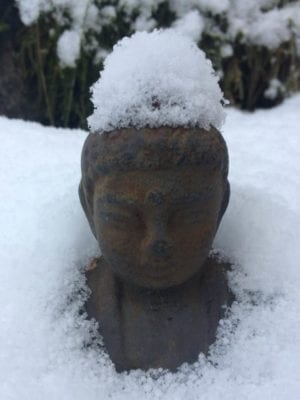
By the Rev. Charles K. (isen) Weaverling
Happy Bodhi Day! In the world of Buddhism, Dec. 8 is an important day of celebration, recognizing Buddha’s enlightenment under the Bodhi tree.
Siddhartha Gautama, who would later become the Buddha, was a prince who left his home in Nepal to search for the meaning of life. His family had protected him from the cares of the world, but as Siddhartha was an inquisitive sort, he traveled about. He saw the misery of old age, sickness and suffering. Because this profoundly affected him, he chose to leave his lavish and indulgent surroundings and seek a more meaningful life.
Siddhartha, after spending six years living the life of an ascetic, practicing severe self-discipline and abstention from all forms of indulgence, and serving under six teachers, still did not find what he was searching for. He tried many different disciplines, such as surviving by eating only one grain of rice per day, but soon realized that this was not the answer. Because he could not find the answers to his questions from others, he vowed that he would sit under the Bodhi tree until he had answered his questions for himself.
Siddhartha fasted and meditated under this tree for a week, and on the morning of the eighth day came to several realizations which were to become the principles of modern Buddhism. It was here, as Siddhartha meditated and gazed upon the morning star of Venus rising, that the basis of Buddhist principles were born as the day dawned.
From this point forward he was referred to as the Buddha — The Enlightened One (One who is awake). He was also known as Shakyamuni (the sage of the Shakya clan) Buddha.
Bodhi Day, the day of enlightenment, can be celebrated in many ways. To the Buddhist, it is a day of remembrance and meditation, much like the Christian celebration of the birth of Jesus on Dec. 25.
To lay practitioners, a good way of recognizing this important event in Buddhism is to dwell on the meaning of this event, and place reminders in the home. Often, lights are strung to recognize the day of enlightenment. The many white or multi-colored lights symbolize the many pathways to enlightenment. The lights are turned on each evening beginning on Dec. 8 and for 30 days thereafter. A candle is also lit for these thirty days to symbolize enlightenment, and a lighted star is often displayed, portraying the rising of the morning star, Venus.
In Buddhist homes, you will sometimes see a living ficus tree (The latin for this tree is Ficus Religiousa, named for the event). Beginning on Bodhi Day, these trees are decorated in many ways: with lights, strung with beads to symbolize the way all things are united, and hung with three shiny ornaments to represent the Three Jewels — The Buddha, the Dharma and the Sangha. Under our tree, we have a small Zen altar, with an image of Buddha, a candle, a flower and incense.
A meal of rice and milk or rice pudding is significant on this holiday. According to Buddhist legend, the milkmaid, Sujata offered this to the Buddha upon his awakening to help him regain strength after his long fast.
Bodhi Day is of importance to Buddhists, and this time of year is important to many others as well. In the quiet of middle winter, following all the holiday activity, as the new year approaches, it’s good to reflect on the past, look for some clarification, and make resolve for the future.
Happy Bodhi Day!














